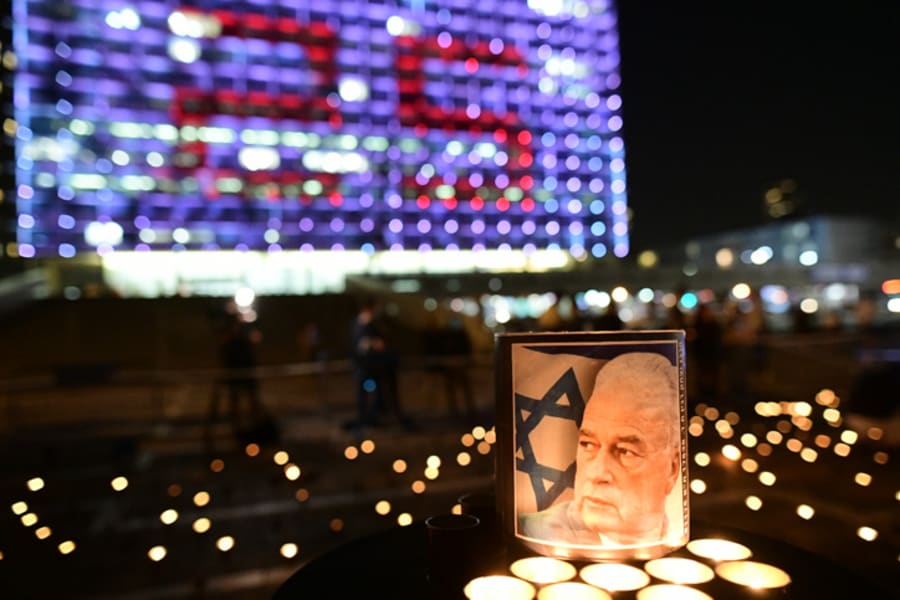30 years after PM Rabin's assassination, many Israelis see high risk of political violence
Most Israelis do not believe authorities doing enough to address political incitement

A new survey by the Jewish People Policy Institute (JPPI) demonstrates that a large number of Israelis fear the possibility of another political assassination, 30 years after the assassination of Prime Minister Yitzhak Rabin.
Rabin was shot by Yigal Amir on Nov. 4, 1995, reportedly over his role in the Oslo Peace Accords. Rabin was shot by Amir after finishing a speech at a political rally in Tel Aviv. The murder shocked the Israeli public and the international community.
The recent JPPI survey revealed harsh criticism of government authorities and a deep divide over the Oslo peace process, which Rabin was committed to. However, the majority of the public still sees Rabin's contribution as positive.
The researchers found that half of the Israeli citizens alive today do not remember the events of Rabin's assassination, either because they were not yet born or because they were too young at the time. Even so, the public continues to see the event as a fault line in society and politics, showing the deep divide between those committed to the Western-initiated peace process and those who believe it is unrealistic.
The 2025 Israeli Society Index by the Jewish People Policy Institute presents a complex picture of fear regarding the possibility of political violence, distrust and deep division along ideological lines, and continued appreciation for Rabin’s contributions to Israeli history.
According to a JPPI survey set to be released in early November, 52% of Israelis believe there is a high likelihood of another political assassination targeting a senior public figure. Another 29% view the risk as low, while 12% do not consider such an event a real danger.
Among the Jewish population, the level of concern is higher – 57% are worried about a possible political assassination, compared to only 30% within the Arab sector. While concern over political violence exists across the spectrum, the survey found that concern increases as one moves from left to right.
The results showed that 42% of Israelis – and almost half of Jews (49%) – believe that a political figure on the right could be assassinated, while only 15% expressed a similar fear regarding a left-wing leader, and only 4% expressed concern of violence targeting a centrist leader.
Approximately one-quarter of Jews surveyed (24%) expressed fear of political violence targeting all sides. The survey also revealed the concern for political violence tracked along ideological lines. Among the respondents on the right, 83% worry about the assassination of a right-wing leader, while 69% on the left fear harm to a left-wing leader. The results reveal that the Israeli public views the danger of political assassination as a real concern, but mainly about its own leaders.
A rare point of consensus across the political spectrum was that authorities are failing to properly address violence against political leaders. According to the survey, 80% of respondents said the government is not handling the issue adequately, while only 4% felt it was being dealt with appropriately.
Differences in opinion were also seen within the Israeli population across ethnic lines, with Jewish respondents showing a higher level of criticism. Among Jewish respondents, 86% said the authorities’ response has been poor, while only 3% expressed satisfaction.
There is a higher level of concern as one moves from left to right. While on the left, 69% said the state is failing to deal with incitement, 94% of respondents on the right expressed the same opinion. The survey also showed that fear of violence is targeted at the political opposition.
Most Israelis, 72%, believe Yitzhak Rabin made a positive contribution to the state of Israel.
Regarding the release of the October 2025 Israeli Society Index, JPPI President Prof. Yedidia Stern stated, "Thirty years after the assassination, the Israeli public continues to see it as a seminal event – but also one that continues to divide. Although we have not experienced an outbreak of political violence for thirty years, the fear index is skyrocketing. The democratic crisis, social media and the war after October 7 are fanning the flames. There is overwhelming agreement that incitement must be dealt with decisively – and that we must all act responsibly towards the state and its leaders.”
“The situation today is no less serious,” Stern warned. “The democratic crisis has deepened the rift between sectors, social networks fan the flames, and geopolitical developments, including the October 7 massacre and the war that followed, have raised the temperature of public life in Israel. All this is unfolding against a backdrop of a dramatic decline in trust in state institutions. We must all act responsibly at this time, toward the state and its leaders.”
The JPPI Israeli Society Index is a monthly index compiled by the think tank. An early version of the October index was released to the media ahead of the 30th anniversary of Rabin’s assassination.

The All Israel News Staff is a team of journalists in Israel.
You might also like to read this:















